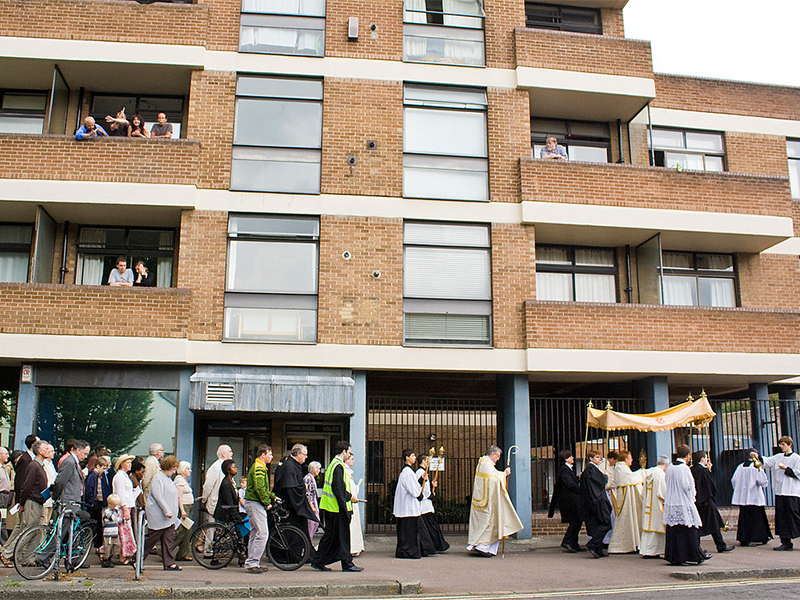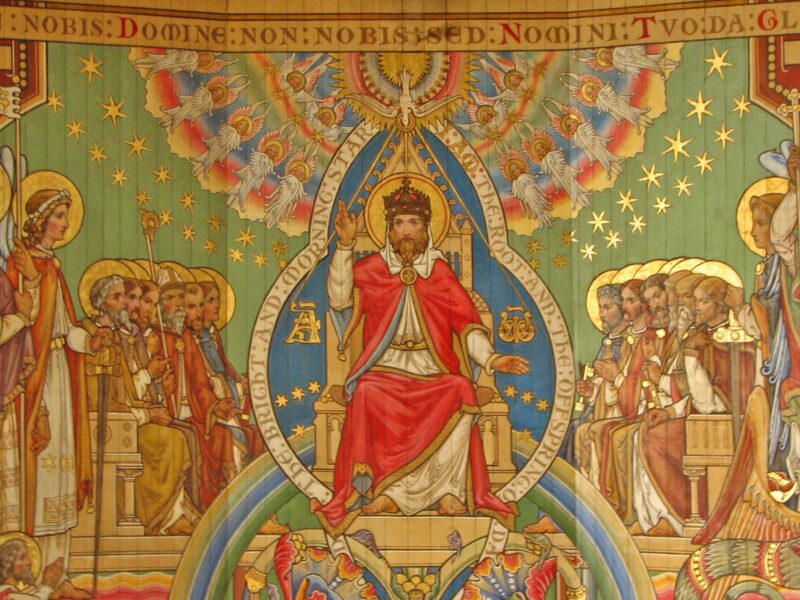
Living Holy Communion
Solemnity of the Body and Blood of Christ (C) | Archbishop Malcolm McMahon OP says that the real presence of Christ in the Eucharist calls us to become an instrument of Christ’s love to those we meet on the streets of our cities.
For older Catholics this great feast evokes childhood memories of outdoor Blessed Sacrament processions, which I am pleased to see are returning to the streets of many of our towns and cities. These are public demonstrations of our faith in the Blessed Eucharist. I have always been aware of the danger of over-interiorising our devotion and participation in Holy communion. It is so easy to think that our Christian life is just about me; my needs my concerns, my relationship with God. But there is another side to the coin. And that is the context in which we receive holy communion. I am talking about the church. When we are offered holy communion, the minister says, ‘The Body (or Blood) of Christ’, and we reply ‘Amen’. But what is that we are assenting to by uttering this word? We are not simply saying I believe that this bread is truly the Body of Christ. The unspoken words are Body of Christ, Head of the Church. Our communion almost by its very name invokes a sense of belonging – many grains become one bread. We are entering into the mystery of the Body of Christ with Christ as its head. Therefore, taking the Blessed Sacrament out of the church in procession is a statement of the belief that the church is there to serve the world. That Christ came for all people, not just catholic and Christians. This liturgical celebration, like all good liturgy, mirrors the service of the church to the world.
The speaker at a course I attended recently, said that to live healthily we have to ‘Live Holy Communion’. She was suggesting that to have good mental health we need to engage with others in meaningful ways. It is not good for our well-being to live in isolation from each other, and that is a truth that we can all accept. But why did she not simply say that we should live in communion or even in community. Why did she use the word holy, which obviously adds a spiritual dimension to our engagement?
What is it that turns community or communion into holy communion? There are many excellent examples of communities that give us a sense of belonging from our immediate family to model railway, these may be holy but not necessarily so. Finding our social context is necessary for human beings to flourish. But something very special happens to that group of people who, baptised in Christ, have him at their centre. After all Jesus promised that when we gather in his name then he will there in our midst, and that he would be with us always even to the end of the age. These two promises of the Lord are the bedrock on which rests our faith in the real presence of Christ in the Eucharist.
In the second reading for today’s feast we have what is probably the earliest record of Jesus’ words at the last supper he had with his disciples he said, ‘This is my body” when he broke the bread, and “This cup is the new covenant in my blood’. St Paul goes on to say, ‘every time you eat this bread and drink this cup, you are proclaiming his death’. Indeed, the Lord has stayed with his community in this remarkable way. He feeds us with his body and blood which the early fathers of the church often call the Divine Food. But this food leads us through death to new life in Christ. Living Holy Communion involves dying as well. We die to our old selves so that we may die with Christ and rise to new life. This is how we enter into the mystery of the Eucharist. It is a profound personal spiritual experience that transforms us into people who live for others and not for ourselves.
The confidence that we show as we celebrate this feast by public processions and celebration of Benediction in the streets and squares of our towns should be but a reflection of the deep faith we have that Christ feeds us with his love.
As you go about your daily life think of yourself as a person who brings life to others and put that into practice in the Christian way. You will then be an instrument of Christ’s love – holy communion to those you meet.
Gen 14:18-20 | 1 Cor 11:23-26 | Luke 9:11-17
Photograph by Fr Lawrence Lew OP of a Corpus Christi Procession in Oxford.
Sorry, the comment form is closed at this time.



A Website Visitor
Holy Eucharist was instituted in the upper room secretly. Entry was restricted only to the Apostles. Not even to Holy Mary. Eucharist itself is called mystery. Even during Eucharistic Liturgy the curtain of the sanctuary is closed. When the Anaphora begins entry into the Church is restricted only of the Baptized ones. Earlier the doors of the Church were closed to make sure no un-baptized was inside. Is the holy eucharist is the food for the soul? Why expose it and make procession with it? Why keep it in the church after the celebration of the Mass? Raju from India